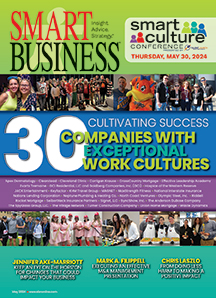
With a new year upon us, many people approach both their business and personal finances with renewed vigor. Whether the goal is to better track expenses, pay off debt, or to grow savings, there are a few questions individuals and business owners should ask to get their finances in order for 2011.
Smart Business spoke to Tracie Gusola and Theresa Bazan of Comerica Bank about how to organize your finances, get the most out of your banking institution and reach your financial goals in 2011.

What is the first step in getting your business and personal finances in line?
Tracie: I believe that in today’s digital world, face time with your banker is extremely important. Get to know your banker and make sure his or her financial viewpoints align with yours. Ask plenty of questions and make sure your banker is explaining their recommendations to you clearly. It is important to tell them about your business or personal needs and goals so they can help you develop a customized financial plan. Building a good rapport with a banker will not only help them better understand your business or personal financial situation, but can also give you the peace of mind that you have a trusted financial adviser and partner.
How can you make sure you’re getting the most out of your money in 2011?
Theresa: The best way to make sure you’re getting the biggest bang for your buck is to be proactive with your account and work with your banker to identify opportunities to make the most of the money you already have or expect to earn.
For example, research different types of business or personal checking accounts to see which one is right for you. Popular checking accounts for individuals include basic, interest-bearing, joint and senior or student checking accounts. And most banks offer a variety of business checking accounts, too, based on your cash flow and deposit levels. Discuss with your banker what types of accounts will make the most of your money.
What are some easy ways to keep track of what you’re spending?
Tracie: One of the best and easiest ways to know what you’re spending is to develop a budget. Developing a budget allows you to see exactly what you have, what you spend and where there is room for saving. Having a budget also allows you to get out of debt by developing a payment plan that aligns with what you can afford each month.
Another way to keep track of your spending is to keep an accurate register in your checkbook. Always remember when you write a check to keep a record of it and to balance your checkbook each month.
Most banks now offer online banking and a great benefit of it is you can instantly see any charges to your account and your account balance. By regularly checking your account, you can keep track of your spending and how much money is in your account, which can ultimately help you avoid unnecessary overdraft fees.
What institution should you be using?
Theresa: Every banking institution offers an array of financial products and services so it’s important to find one that best meets your needs. If you own a business, then you may need special banking products and services like small business loans, business checking accounts and cash management products. If you have a large amount of money to invest, you should look for a bank that has a dedicated wealth management team that can help you with everything from portfolio management to asset management accounts. Before you put your money into any bank make sure the services they offer align with your financial needs.
What other services do banks typically offer?
Tracie: Very often banks offer more products and services than you think. Many institutions offer online bill pay services, allowing you to save money on postage stamps and envelopes. You can also find insurance and business services at banks, as well as financial planning tools, loans and investing services. Comerica has a team of financial planners that can help you with retirement planning, education funding and estate planning. We also offer personal insurance services like life and estate planning, disability and long-term care, and business insurance like business succession plan funding.
Tracie Gusola is a senior vice president and North Texas retail regional manager for Comerica Bank. Theresa Bazan is a senior vice president and South Texas retail regional manager for Comerica Bank. Comerica Bank is the commercial banking subsidiary of Comerica Incorporated (NYSE: CMA), the largest banking company headquartered in Texas, and strategically aligned by three business segments: The Business Bank, The Retail Bank, and Wealth & Institutional Management. Comerica focuses on relationships, and helping people and businesses be successful. In addition to Dallas, Houston and Austin, Texas, Comerica Bank locations can be found in Arizona, California, Florida and Michigan, with select businesses operating in several other states, as well as in Canada and Mexico. Comerica reported total assets of $55.0 billion at September 30, 2010. To receive e-mail alerts of breaking Comerica news, go to www.comerica.com/newsalerts.

